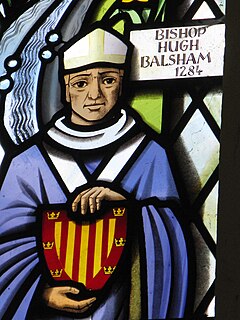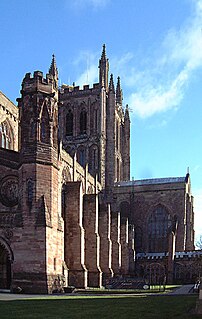Related Research Articles

John Peckham was Archbishop of Canterbury in the years 1279–1292. He was a native of Sussex who was educated at Lewes Priory and became a Friar Minor about 1250. He studied at the University of Paris under Bonaventure, where he would later teach theology. From his teaching, he came into conflict with Thomas Aquinas, with whom he debated on two occasions. Known as a conservative theologian, he opposed Aquinas' views on the nature of the soul. Peckham also studied optics and astronomy, and his studies in those subjects were particularly influenced by Roger Bacon and Alhazen.

Hugh de Balsham was a medieval English bishop.

Robert Kilwardby was an Archbishop of Canterbury in England and a cardinal. Kilwardby was the first member of a mendicant order to attain a high ecclesiastical office in the English Church.
Robert Winchelsey was an English Catholic theologian and Archbishop of Canterbury. He studied at the universities of Paris and Oxford, and later taught at both. Influenced by Thomas Aquinas, he was a scholastic theologian.

Richard Poore or Poor was a medieval English bishop best known for his role in the establishment of Salisbury Cathedral and the City of Salisbury, moved from the nearby fortress of Old Sarum. He served as Bishop of Chichester, Bishop of Salisbury and Bishop of Durham.
Philip Repyngdon was a bishop and cardinal.
John le Romeyn, died 1296, was a medieval Archbishop of York.
Richard le Grant was Archbishop of Canterbury from 1229 to 1231.
Nicholas Farnham was a medieval Bishop of Durham.
Walter of Kirkham was a medieval English official who held the positions of Keeper of the Wardrobe, Dean of York, and Bishop of Durham. He was elected bishop over Aymer de Valence, 2nd Earl of Pembroke, the brother of King Henry III. As bishop, he was instrumental in the founding of Balliol College in the University of Oxford.
Roger de Clinton was a medieval Bishop of Coventry and Lichfield. He was responsible for organising a new grid street plan for the town of Lichfield in the 12th century which survives to this day.
Richard Peche was a medieval Bishop of Lichfield.
Alexander de Stavenby was a medieval Bishop of Coventry and Lichfield.
Roger de Meyland was a medieval Bishop of Coventry and Lichfield, England.

Richard Blund was a medieval Bishop of Exeter.

Peter Quinel was a medieval Bishop of Exeter. He became a canon of Exeter Cathedral in 1276 and his episcopate began in 1280 and continued until he died in 1291. He issued a set of rules governing the clergy in his diocese and the required furnishing of churches and continued the rebuilding efforts at Exeter Cathedral.

Edmund Lacey was a medieval Bishop of Hereford and Bishop of Exeter in England.
Ralph of Maidstone was a medieval Bishop of Hereford.

Richard Swinefield was a medieval Bishop of Hereford, England. He graduated doctor of divinity before holding a number of ecclesiastical offices, including that of Archdeacon of London. As a bishop, he dedicated considerable efforts to securing the canonisation of Thomas de Cantilupe, his predecessor, for whom he had worked during his lifetime. Active in his diocese, he devoted little time to politics. He was buried in Hereford Cathedral where a memorial to his memory still stands.

John Bokyngham was a medieval treasury official and Bishop of Lincoln.
References
- Franklin, M. J. (2004). "Wesham, Roger of". Oxford Dictionary of National Biography (online ed.). Oxford University Press. doi:10.1093/ref:odnb/29066.(Subscription or UK public library membership required.)
- Fryde, E. B.; Greenway, D. E.; Porter, S.; Roy, I. (1996). Handbook of British Chronology (Third revised ed.). Cambridge, UK: Cambridge University Press. ISBN 0-521-56350-X.
- Moorman, John R. H. (1955). Church Life in England in the Thirteenth Century (Revised ed.). Cambridge, UK: Cambridge University Press.
- Swanson, R. N. (1995). Religion and Devotion in Europe, c. 1215-c. 1515. Cambridge Medieval Textbooks. Cambridge, UK: Cambridge University Press. ISBN 0-521-37950-4.